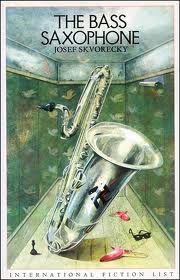Josef Skvorecky’s The Bass Saxophone is one of a handful of fine novels identifying the extraordinary powers of jazz  as an art form, a process, a heritage — which makes it more than something to listen or dance to. Several obits for the Czech writer (d. Jan 3, age 87) who was long exiled in Canada have failed to mention his admiration and understanding of this American gift to the world, but the Atlantic Monthly gives him his due.
as an art form, a process, a heritage — which makes it more than something to listen or dance to. Several obits for the Czech writer (d. Jan 3, age 87) who was long exiled in Canada have failed to mention his admiration and understanding of this American gift to the world, but the Atlantic Monthly gives him his due.
Like Milan Kundera and Vaclav Havel, Skvorecky infused his depictions of a jazz-inflected cultural underground in opposition to tyrannical, absurdly bureaucratized government with sly, corrosive humor. Not surprisingly, he also wrote detective stories and  essays on literature, politics, jazz and the movies, including one that links Kafka to jazz (which I haven’t read but shall immediately).
Hats off to this author, who translated Dashiell Hammett into Czeck and took it upon himself to become a publisher of other dissident writers. Skvorecky demonstrated how the arts produced in the 20th century urban U.S. have relevance far bey0nd our borders, which should remind we who live here not only that those arts have been pretty significant, but that they remain so in the present and for the looming future, both abroad and right at home.

